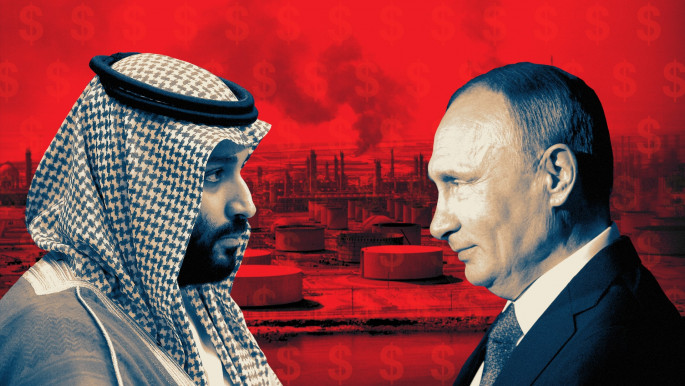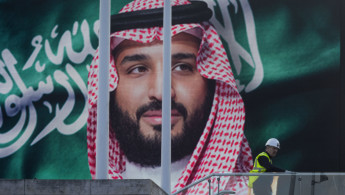Saudi-Turkey media war reflects MBS's growing internal problems
On 11 April, Saudi authorities blocked access to several Turkish media outlets, including the Arabic portals of Turkey's official broadcaster TRT and the Anadolu news agency.
Although no official statement was given at the time, a message was displayed on the blocked websites saying, "the requested page is against the regulations of the Ministry of Media".
Two days earlier, Saudi trolls took to Twitter under the hashtag (#حجب_المواقع_التركية), demanding the blocking of Turkish news websites.
Bots, along with some Saudi writers and journalists, joined the campaign and accused the websites of being "plagued by mercenaries of Qatar and the displaced Muslim Brotherhood". Others claimed that the Turkish news websites were "trying to invade the kingdom intellectually".
Ankara reciprocated Riyadh's measures by blocking Saudi and Emirati news websites, including the official Saudi news agency SPA, the UAE's WAM news agency, and more than a dozen other news sites.
 |
|
| Read more: NEOM: How MBS's megaproject enraged a tribe and created a martyr |
One blocked website of interest was the Turkish portal of the UK-based Independent newspaper. According to Nevzat Çiçek, the Editor-in-Chief of the Independent Turkish, the website had nothing to do with the ongoing media war between the two sides. Others, however, differ with him on this.
On 13 April, a junior Saudi Royal called Bandar bin Saud published an article in the Saudi Okaz newspaper in which he praised his country's decision to block the Turkish news websites.
Bandar went even further to claim that the Independent Turkish, which is owned by Saudi and Russian businessmen, is part of a Saudi plan against Turkey. He called on officials to use the website to shift the battle against Ankara.
"If this is a media war, it is a unilateral one," Yusuf Erim, editor-at-large at TRT World, told The New Arab.
"Turkey's decision to restrict Saudi Arabia linked media outlets is strictly based on the diplomatic principle of reciprocity. The Saudis spend a lot of time and energy worrying about Turkey. For Ankara, Riyadh is a lesser priority on its foreign policy agenda," he added.
However, Quentin de Pimodan, an analyst at RIEAS who follows Saudi Arabia and the Gulf, believes that the Turkish narrative is a threat to Saudi Arabia.
 |
A growing media battle between regional rivals Saudi Arabia and Turkey has escalated in recent weeks, adding a new layer of conflict to their already strained relations |  |
"When it comes to narratives, Turkey is much more of a threat to KSA than any other state including Iran," he told The New Arab.
"The Saudi leadership is aware of that and tries to push back as much as possible whether by reshaping the education curricula regarding the Ottoman Empire, or by using well-known clerics such as Ayed Al-Qarni to attack Turkey, or even by banning Turkish TV shows," he added.
Read more: Saudi Arabia's faltering divide and rule strategy in Yemen
During the last few months, Twitter deleted thousands of fake accounts that were used to spread propaganda on behalf of Saudi Arabia, amplify messages favourable to Saudi authorities, or publish content "praising Saudi leadership, and critical of Qatar and Turkish activity in Yemen".
Relations between Saudi Arabia and Turkey haven't been easy since the 2017 Gulf crisis and the elevation of Mohammed bin Salman's status to Crown Prince.
The contradictory regional agendas of Riyadh and Ankara put them on a collision course despite the good relations that King Salman and Turkey's Erdogan once enjoyed. Since then, the gap between the two states on a bilateral and regional level has been widening.
 |
|
| Read more: Less than zero: Saudi Arabia's role in crushing the US oil industry |
The murder of Jamal Khashoggi, the Saudi journalist who was butchered in his country's consulate in Istanbul in 2018, brought a new dimension to the conflict between the two states.
Saudi officials refused to confess their crimes, which led the Turkish intelligence to leak significant parts of the evidence to the media.
"The Saudis seem to find Turkey's media outlets very threatening, especially their coverage of the Khashoggi investigation. The kingdom had hoped the opaque legal circus it presented was enough to put an end to the Khashoggi case, but the Turks seem intent on carrying out their own legal proceedings," Erim said.
Read more: Families plead with Saudi authorities to return bodies of relatives beheaded in mass execution
According to him, "the press coverage coming out of Turkey will obviously be very detrimental to the narratives that Riyadh has been trying to build at home".
The latest round of media escalation against Turkey started in early March when Saudi commentators urged their fellow citizens not to go to Turkey because "reckless Erdogan wants to transmit the Covid-19 to the Saudi and Arab tourists to spread it in the kingdom and the Arab countries," one retired Major General said on the Saudi-24 TV channel.
 |
Relations between Saudi Arabia and Turkey haven't been easy since the 2017 Gulf crisis and the elevation of Mohammed bin Salman's status to Crown Prince |  |
In turn, Turkey's interior minister accused Saudi Arabia of keeping the world in the dark about the coronavirus. The Saudi failure to warn other countries about the coronavirus on its lands amid Umrah season endangered Turkey and other countries.
As a result, Turkey has quarantined more than 10,330 pilgrims returning from Saudi Arabia to guard against the spread of the virus.
"It is a long game played by both countries amid diplomatic tensions," de Pimodan said.
"Saudis have painted a dark image of Turkey, notably regarding tourism. They strengthened diplomatic relations with Ankara's foes such as Greek Cyprus, and of course the way the Turkish authorities managed the release of information on Khashoggi's case was to the great discomfort of KSA," he added.
The Saudi blocking of Turkish news websites came at the same time as the decision of a Turkish court to accept an indictment over the killing of Khashoggi.
 |
|
| Read more: Could Mohammed bin Salman's power grab unravel Al Saud rule? |
The Turkish prosecutors formally charged twenty Saudis, including the former deputy intelligence chief Ahmed al-Assiri, and Saud al-Qahtani, the former aide of MBS. This has led many to conclude that the two developments might be closely related.
The timing of the media escalation against Turkey raises questions though about the motives of officials in the Gulf Kingdom. It also coincides with a growing list of internal problems for Mohammed bin Salman.
In early March, several members of the royal family were arrested, including Prince Ahmed bin Abdulaziz al Saud, a brother of Saudi King Salman, and Prince Mohammed bin Nayef bin Abdulaziz al Saud, the king's nephew who is also known as MBN.
Shortly after, Saudi officials decided to launch an oil price war against Russia, resulting in an unprecedented drop in oil prices for the first time in more than 20 years.
The oil price war will cost Riyadh a fortune, but most importantly, as prices of US crude oil futures plunged to a stunning minus-$37.63 a barrel for the first time in US history, the Kingdom's price war severely undermined MBS' only western ally, Trump, who is considering a halt of Saudi oil imports.
 |
Since Khashoggi's killing and the failure to handle the Iranian threat, more Saudi royals and business elites are frustrated and even concerned about the Crown Prince's ability to run things |  |
To add salt to the wound, the Covid-19 pandemic also forced Saudi Arabia to cancel the Hajj season, which constitutes a great source of revenue for the kingdom.
MBS's 2030 vision has also been disrupted, and he lost the opportunity to host the G-20 meeting, and thus the chance to rebrand himself.
Since Khashoggi's killing and the failure to handle the Iranian threat, more Saudi royals and business elites are reportedly frustrated, unsatisfied, and even concerned about the Crown Prince's ability to run things. Such sentiments in these circles have only grown since then.
In such a tense environment, escalating against Turkey might seem like a good tool to trigger hyper nationalistic sentiments and rally supporters around MBS.
However, it would complicate rapprochement efforts in the future, and further undermine the regional and international stance of the Kingdom amid growing internal problems.
Ali Bakeer is an Ankara based political analyst/researcher. He holds a PhD in political science and international relations. His interests include Middle East politics with a particular focus on Iran, GCC countries and Turkey.
Follow him on Twitter: @alibakeer



